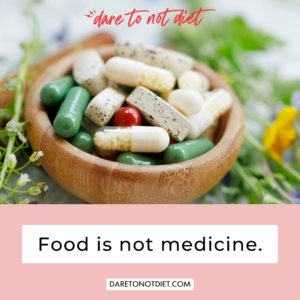Blog

I was at a party a long time ago when a nice woman asked me what I did. I said I was a dietitian. She beamed and clasped her hands together and said, “Oh, that’s wonderful. Food is such medicine, isn’t it?”
I didn’t know how to respond at that moment. Food-as-medicine eating, for me, had at one point taken the guise of “clean”, local, organic eating all for my “health.” Really I was just finding new ways to restrict for my weight. I also had the vague sense that food purity might grant me immortality if I just did it right.
Behind all this was really just a desire to “fix” certain things that felt broken in my life. I was medicating today for a longer tomorrow in which I’d hopefully have more happiness.
The importance of enjoying food
Eating medicine is not as fun as eating food, and turning food into medicine is downright depressing. Food is food; it nourishes us, gives us energy, keeps us alive, and is necessary to our existence. Enjoyment of food is essential and this study from the 1970s shows that. Thai and Swedish women were both given a traditional Thai meal. The Thai women absorbed almost 50% more iron from the meal than the Swedish women, who felt it was too spicy. Then the traditional meals for both groups were pureed into mush and eaten. Guess what? Iron absorption for both groups decreased by 70% — even when eating their own traditional food. Let’s face it – puree is just not as tasty as the original-textured food!
If you’re treating your food like medicine, holding your nose and shoving it in, or dutifully eating “healthy” food but wishing for something else instead, you’re doing your body and your mind a disservice. What you eat on a meal-by-meal basis is not as important as how you eat. Having a relaxed relationship to food, providing regular, reliable meals for yourself, allowing internal signals of hunger and fullness regulate your intake, and eating food you enjoy is healthy. This way of eating optimizes variety, which ensures good nutrition.
Medical Nutrition Therapy
There are certain disease conditions for which changing what you eat can help to manage that condition. But there is a big difference between disease management vs. disease prevention. Eating low sodium your whole life will not necessarily stave off high blood pressure. Eating no carbs will not ensure you will never get diabetes. Many diseases have a genetic component, and eating a certain way does not guarantee that you will not get a disease. However, feeding yourself regularly in a positive, non-diet way does support health and is great disease prevention.
While diet can help manage conditions, it rarely cures them. People with celiac disease must strictly avoid gluten, but this does not cure the disease. People with hypertension can reduce dietary sodium to help manage blood pressure but they also need to exercise, manage stress, and sometimes take actual medication. And you cannot cure cancer with food (I’m sorry, you just can’t). Food is important and will help keep someone with cancer alive while it receives actual medicine which really can cure.
It’s true that many foods have medicinal properties. Cinnamon may help lower blood sugar in diabetics. Turmeric may have anti-inflammatory properties. Here’s the problem: will you start to sprinkle cinnamon on everything you eat even if it doesn’t taste good? I love turmeric – in a few dishes. A little goes a long way. But studies often show that in order to show a direct benefit of the medicinal properties of these foods, you have to have large quantities of it – more than you’d want to eat of anything in a day. Also, what we know about the synergistic properties of foods can so far fit in a thimble. Isolating compounds for their magic properties is reductive thinking. Food compounds interact with one another and we’re only just starting to understand this better now. Again, getting a varied diet of foods you enjoy will help you to get some of everything you need.
I know Hippocrates said, “Let food be thy medicine and medicine be thy food,” and back then that made sense when they didn’t have a lot of actual medicines. But now we’ve got another problem which is a world full of disordered eating, so maybe it’s time to back off this food-as-medicine idea for a while.
Food does not need to be medicine, especially in the absence of illness. Food just needs to be food – delicious, enjoyable, varied, reliable fuel for your body – because that’s how it serves us in the healthiest way possible.
Start your path to normal eating with my free guide, 5 Strategies to Stop Overeating
Dietitians Unplugged Podcast